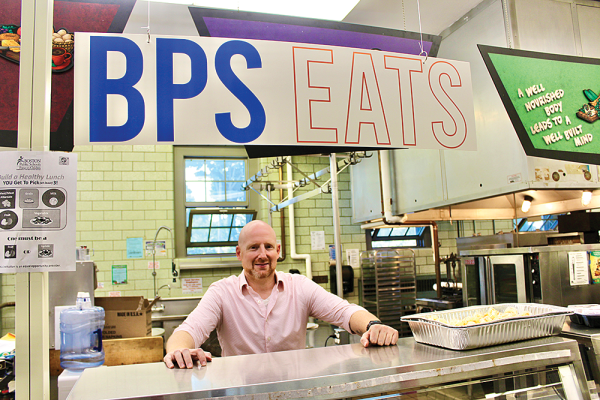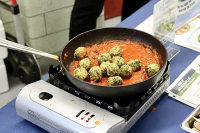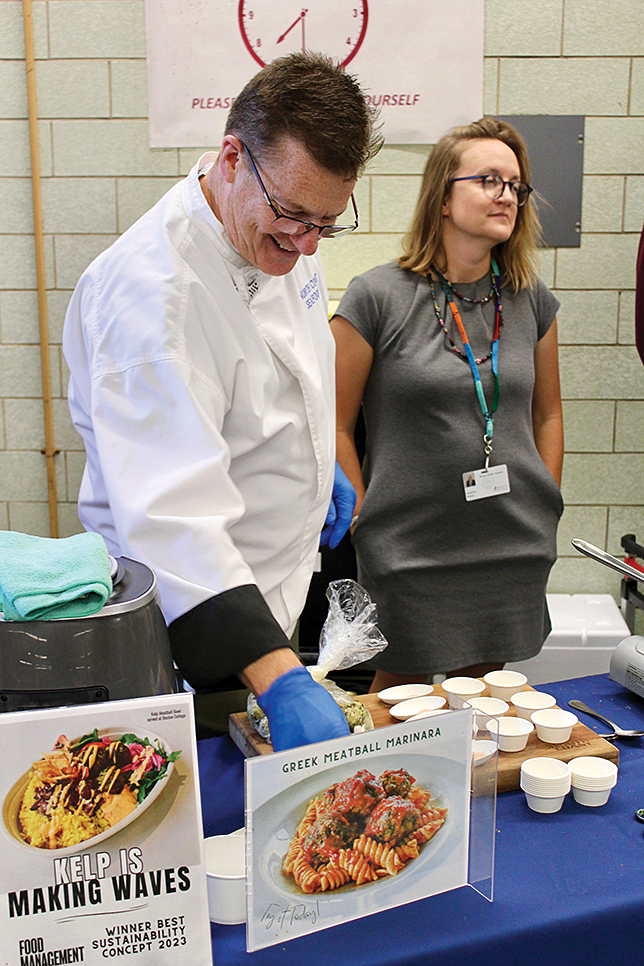September 11, 2024

Andrew Urbanetti the assistant director of culinary programs for BPS, is excited that students will enjoy new menu items - like the kelp-based seaweed-ish meatball shown below. Cassidy McNeeley photos

The start of a new school year features many new things like a backpack or a pair of sneakers, but for Boston Public School students this fall it also means a new lunch menu that is meant to mirror the diversity in the community.
A sampling of this year’s offerings includes seaweed-ish kelp meatballs created by North Coast Seafoods, bagels made by One Mighty Mill, field fritters from the CommonWealth Kitchen, and a tasty tikka masala sauce from Meal Mantra.
Andrew Urbanetti, the assistant director of culinary programs for BPS, created this year’s luncheon fare with the help of several other managers.
“What we’re trying to do,” he said, “is develop a menu that represents the cultural diversity that is inspired and a direct result of the grassroots conversations we had with the students, families, and teachers as well as the workers. It’s a collaborative effort. It isn’t just one man, it’s a culmination of the voices of our city.”
A chef by profession, Urbanetti was hired by BPS food services over a year ago to increase the number of students eating healthier school lunches.
“We have an excellent nutrition team that helps design the required amounts of X and Y that need to go on a plate to fulfill what the FDA [US Food and Drug Administration] says is necessary for a healthy school lunch,” Urbanetti told The Reporter. “I try to elevate that by adding chef knowledge and new techniques, flavors, spices, and methods of bringing in fresh local products from New England which inherently taste better.”
One of these local products is an unusual but much requested meat alternative: kelp. Andrew Wilkinson, North Coast Seafoods’ in-house chef and its director of research and development, helped to make kelp a permanent spot on the lunch menu.
“We created the world’s first seaweed-ish meatball,” he said with a touch of pride. “We get to tell kids about conscious eating habits. That not only is this good for you, but it’s also extremely good for the environment. Kelp is the only plant in the world that needs no land, no fresh water, no food, and it would never get a pesticide or an herbicide.” The nuggets, which are made of kelp, green chickpea, and brown rice, contain very few extra ingredients, allowing more students to enjoy the snack from the sea.

During Covid, Andrew Wilkinson, North Coast Seafoods’ in-house culinary seafood special and chef director of research and development, created the seaweed-ish meatball as a passion project. This year, students around the city will get to enjoy the plant-based nugget.
Cassidy McNeeley photo
Added Wilkinson: “The kicker for this for K-12 is it is allergen-free. There’s no gluten, dairy, or soy. This is one of the healthiest things you can eat and one of the most nutrient-dense plants you can eat in the world. Plus, it counts as a protein so everyone at BPS can substitute meat for this plant-based item and get plenty of protein.”
Not only is kelp a healthy option, but it’s also a tasty one, as Wilkinson explained: “Anything you can do with a meatball you can do with this. It’s also a veggie nugget with a dipping sauce and it makes an unbelievable meatball sub for the kids these days.” Other dish options include kelp power bowls and salads as well as kelp burgers and sliders.
Urbanetti says the kelp is his favorite new dish. It can be the hardest to persuade students to try it, but once they get their sea legs, they are hooked, he said. “When we tested it with students last year, groups were coming up for sixth or sevenths, asking for more.”
He, too, is asking for more – from the students. “I grew up when ketchup was a vegetable. Every year is another chance for us to build on students’ preexisting beliefs. Especially with the younger students, bit by bit, we can teach them that this is the new normal. That they don’t have years of industrialized looking food on the plate, that they can get years of seeing something that actually tastes what it looks like.”
One brand working hard toward this goal is One Mighty Mill. The Lynn-based flour company is reintroducing the world to nutritious stone-milled flour through bagels, bread, tortillas, pizza crusts, and pretzels.
This year, offerings of Mighty-branded plain, everything, and cinnamon raisin bagels will be in all Boston Public Schools. These bagels are nutritious because they are not made of industrialized flour nurtured by pesticides, preservatives, or additives.
One Mighty Mill products maintain the whole grain’s healthy fiber, protein, and nutrients by using stone mills to grind down organic whole wheat grown by local farmers. “Our flour, we literally just take it out of this machine, turn it into a dough, let it ferment to make it easier for you to digest, and then we bake it. That’s it,” Eloi said.
Prior to getting involved in Boston, One Mighty Mill partnered up with public schools in Lynn and Springfield. “Our mission is important,” said Eloi. “It’s about getting kids to eat healthy. Since we’ve started, over 600,000 bagels have gone to the school systems.”
In addition to seaweed-ish meatballs and Mighty bagels, kids across the city’s elementary, middle, and high schools can enjoy field fritters from CommonWealth Kitchen in Dorchester (CWK).
The field fritter is a falafel-like nugget made of yellow field peas, garlic, onions, cilantro, parsley, and spices. Yellow field peas are generally used as cover crops but CWK had another idea.
“Organic farmers use crops that sink nitrogen and augment their soil. Usually they just plow it under and that sinks the nitrogen in,” said CWK director of business development Alden Cadwell. “What we’ve done is we created a supply chain for one of those cover crops, which is yellow field pea, and we made a falafel out of it and BPS is putting it on the menu this year.”
Once cooked, the power protein plant has a crunchy exterior and smooth interior and can be served in many ways. Cadwell predicts that cafeteria staff will use the field fitter in salad bars, grain bowls, and traditional gyros. For his part, he is hoping to see it served with tikka masala sauce from Meal Mantra, one of CWK’s many members.
Meal Mantra, founded by Tarun and Anu Bhalla, offers seven sauces that not only add flavor to food but also build connection and community in the kitchen.
Inspired by Anu’s grandfather, the famous chef Kundan Lal Gujral, and the couple’s background in the medical field, Meal Mantra presents flavor in a healthy format.
“What Anu and I have tried to bring into our food is passion, and I hope it will be felt, enjoyed, and appreciated for that,” said Tarun. “All of our ingredients are natural. I’ve been a physician and a doctor in the pharmaceutical world, so I know the challenges and things with chronic diseases and lifestyle. We wanted to do food in a way that we felt in the heart that this is how we need to eat.”
Of the seven sauces, all are free of artificial ingredients as well as gluten and nuts. Four of them, including the cranberry tomato chutney, are also vegan. While only the Tikka Masala Simmer Sauce will be offered in Boston schools this year, the Bhallas are confident their other sauces will be added soon enough.
Specifically, they hope that their award-winning sauce challenges misconceptions surrounding Indian cuisine.
“A lot of people think Indian is spicy, said Tarun. “That is a corruption of the Indian cuisine that has been presented to the American consumer.” He made it clear that across the world, many people use the same spices and flavors but maybe not in the same way. “It’s just that we use them a little differently and they become relevant to our culture. But it can be appreciated by other people.”
Offered these new menu items, Urbanetti thinks students across the city will enjoy tasty foods, dip into other cultures, and support local businesses. “The learning they experience here in the cafeteria, we treat this as another classroom. It’s another way to educate and inform them and introduce them to new fruits, flavors, textures, it’s kind of a win-win,” he said.
He added: “Our students are still in their developmental phase. Everything they put in their body is helping to build not only their bodies but their minds. There is a difference between students taking the meal because they feel like they have to and then throwing it away versus taking it and being excited about it. My goal is the latter.”
Your reporter offers this observation after spending time with these culinary delights and their creators: The tikka masala will pair nicely with the field fritter as well as the seaweed-ish meatball. It might not be great on a Mighty bagel but we’re not here to yuck anyone else’s yum.


